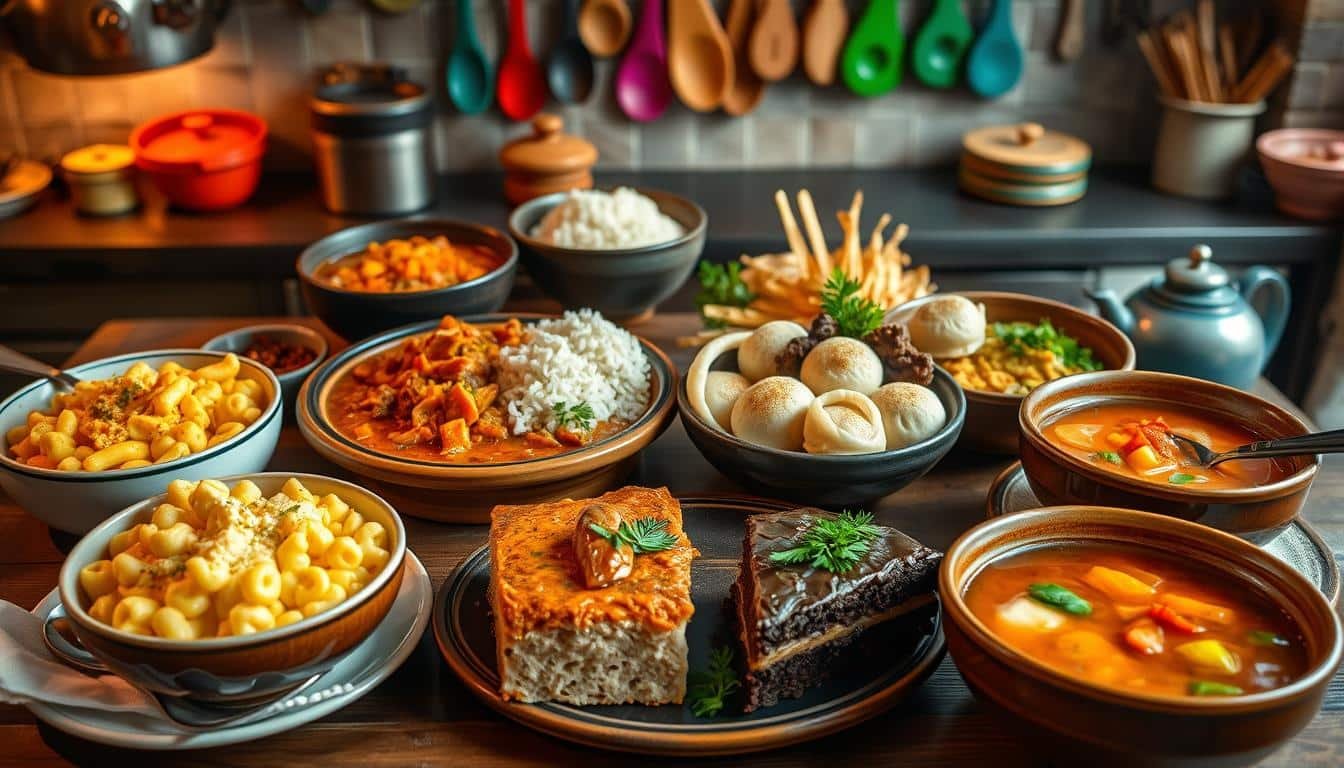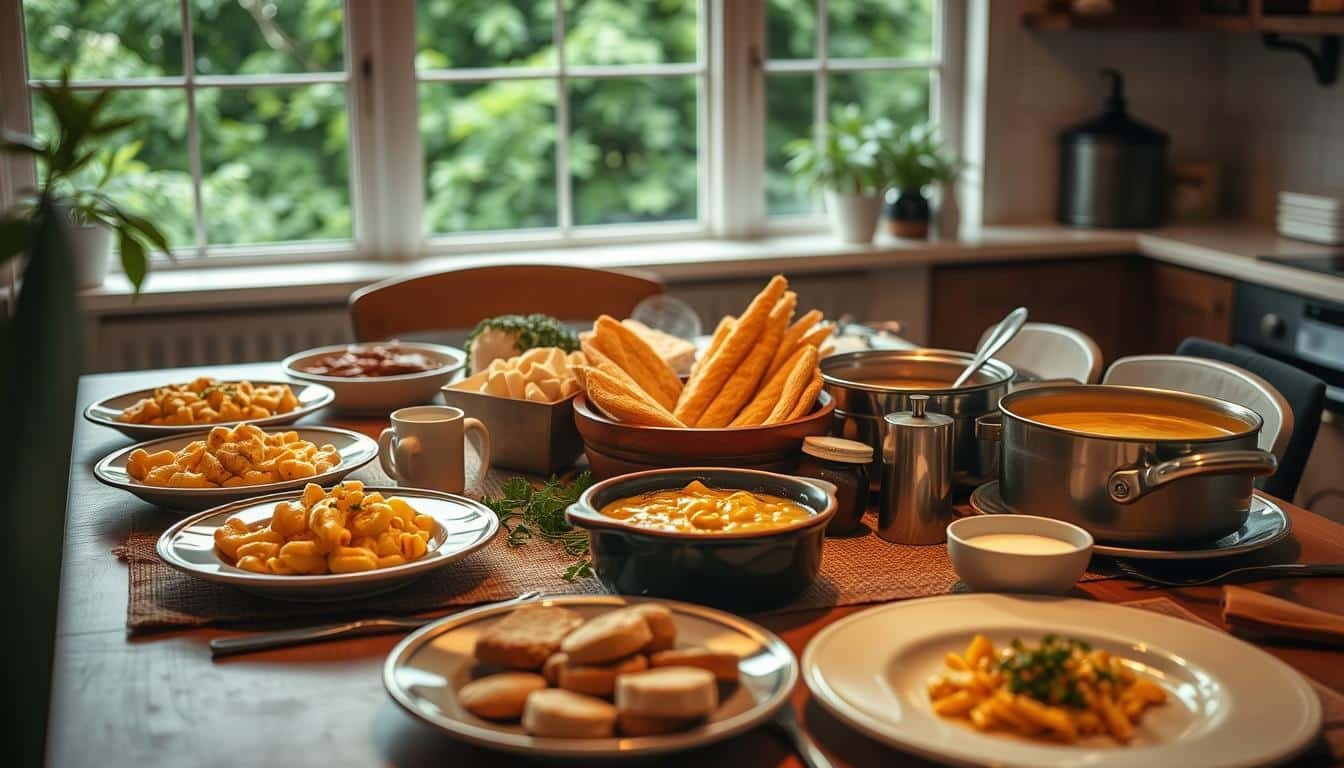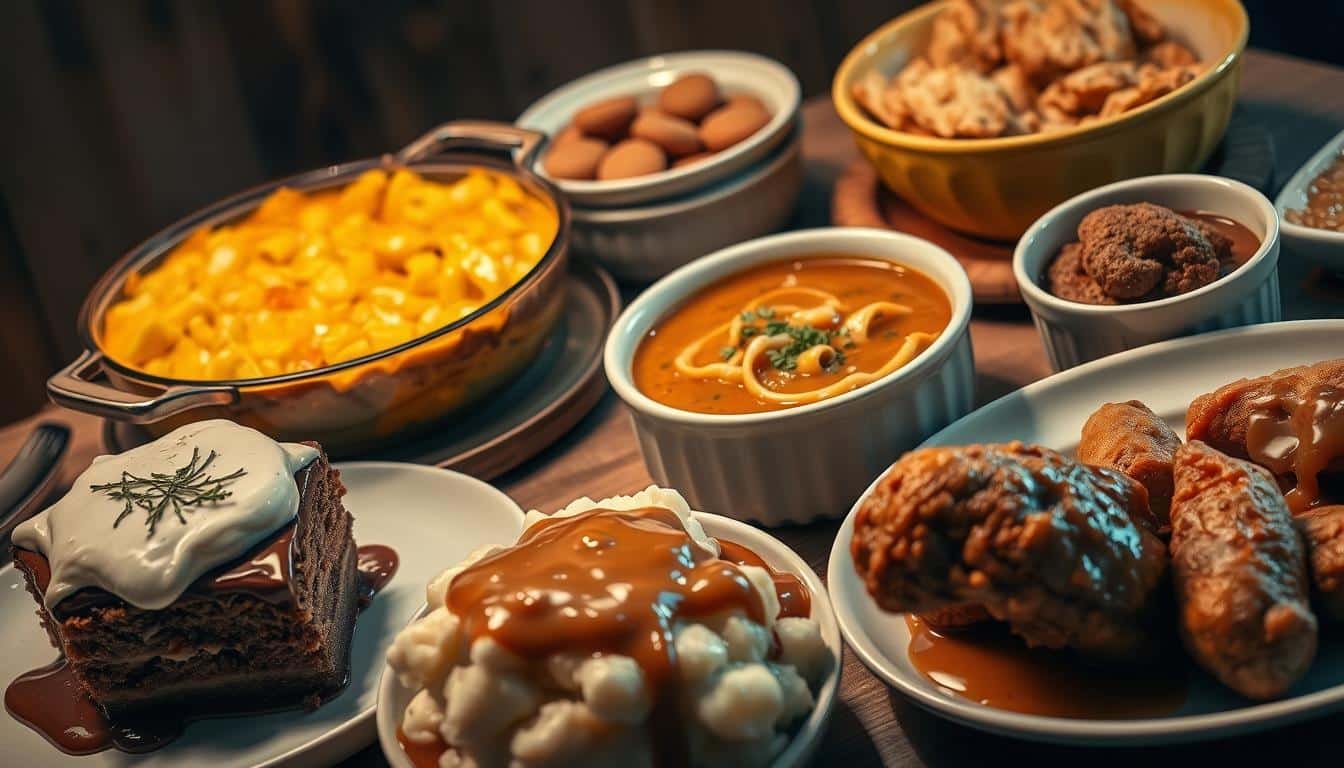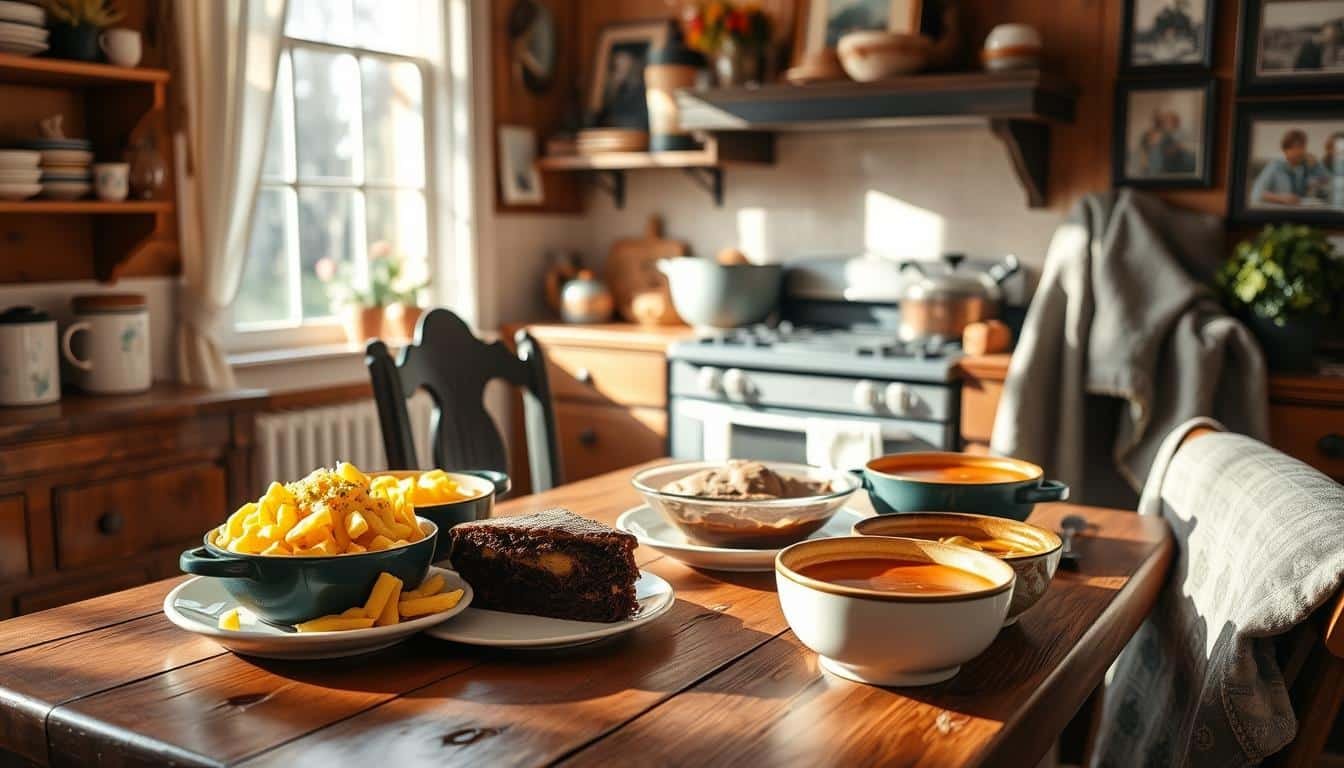Comfort foods have a special spot in our hearts and minds. They give us emotional satisfaction and bring back nostalgic memories. These dishes, often linked to childhood or cultural traditions, offer a sense of security and comfort. They can be a big help when we’re feeling stressed or anxious.
Research shows that many people turn to comfort foods when they’re feeling down. This is true for both those who aren’t seeking medical help and those who are. It’s a way to find solace in familiar tastes and smells.
The magic of comfort foods lies in how they make us feel. They’re often rich, sweet, or savory, which makes our brains happy. This happiness can even help our mental health and make us live longer. It’s clear that these foods have a big impact on our well-being.
Key Takeaways
- Comfort foods provide emotional satisfaction and nostalgic memories, often associated with childhood or cultural traditions.
- These soul-warming dishes impact our well-being by offering a sense of familiarity and security during moments of stress or anxiety.
- Comfort eating is prevalent, ranging from 15-46% in non-clinical samples to 47-71% in clinical samples.
- Comfort foods activate the brain’s reward system, triggering positive emotions and memories.
- Studies have linked comfort eating to reduced mortality and improved mental health.
The Science Behind Emotional Eating and Well-being
Comfort foods might give us a quick break from bad feelings. But, the science shows it’s more complex. It involves brain chemistry, nostalgia, and the good feelings we get from familiar foods. This explains why some dishes can really lift our mood and improve our well-being.
How Comfort Food Affects Brain Chemistry
Stress or bad feelings often lead to emotional eating. Studies show that comfort foods can activate our brain’s reward system. Foods rich in fat, sugar, and salt can make us feel good by releasing dopamine. This feeling can help us cope with tough emotions.
The Role of Nostalgia in Food Preferences
Nostalgia also plays a big part in why we love certain foods. The emotional bond we have with some dishes can greatly influence our choices. These familiar tastes and textures remind us of happy times, making us feel safe and connected.
Psychological Benefits of Familiar Foods
Comfort foods do more than just make us feel good in the moment. They can also boost our mood and motivation. Studies show that feeling positive can lead to better health. This includes lower blood pressure, a healthier weight, and even longer life.
“Emotional eating is often triggered by stress accompanied by negative emotions, with these foods suspected to have positive emotional effects.”
Understanding Comfort Foods: More Than Just a Meal

Comfort foods are foods that make us feel better or more at ease. They often remind us of our childhood or favorite dishes. These foods offer a sense of security and calm, going beyond just taste to touch our emotions.
Studies show that certain foods, like carbs and sugars, can boost our mood. They release happy hormones like serotonin and dopamine. Carbs, in particular, can make us feel more relaxed by increasing serotonin levels in our brains.
Our love for comfort foods comes from nostalgia and personal memories. Merriam-Webster says comfort food is food that feels like home. Oxford Dictionaries adds that it’s often sweet or high in carbs, reminding us of childhood or home.
“Comfort foods should not make you feel ashamed,” suggests food writer Emily Nunn, emphasizing the importance of embracing the emotional connection and personal significance these foods hold.
Comfort foods also have practical benefits. Having basic ingredients and mixes ready can lead to endless comfort food creations. Leftovers and quick meals like jarred pasta sauce can also satisfy our cravings. Moving from processed to homemade comfort foods can make our diet healthier.
In the end, comfort foods are more than just food. They bring us emotional comfort, nostalgia, and well-being. They have the power to lift our mood and offer security when we’re stressed or anxious.
Cultural Significance and Traditional Comfort Foods

Comfort foods are deeply meaningful, tied to our personal and family stories. They are passed down through generations, showing the rich heritage of different places and communities. From grilled cheese to Oaxacan moles or Jamaican oxtails, these foods bring together diverse tastes and stories that touch our hearts and culture.
In Black American culture, “soul food” is more than just food. It’s a way to express humanity and keep cultural identity alive. For those who have moved or immigrated, comfort foods offer a taste of home, bringing back memories and a sense of belonging.
Regional Comfort Food Variations
Comfort foods differ by region and culture, showing off local ingredients and cooking styles. Soups, for example, are loved worldwide for their warmth and ability to bring people together during family meals.
Family Recipes and Heritage
Family recipes and traditions are key to our comfort foods. These dishes, shared through generations, feed both our bodies and souls. They connect us to our family and cultural roots.
Global Comfort Food Favorites
Comfort foods know no borders, with cuisines from around the world offering their own favorites. From Italian pasta to Indian curries, these dishes offer a mix of the familiar and new, inviting us to explore and enjoy.
“Comfort foods, with their ability to evoke nostalgic memories and provide a sense of belonging, have the power to transcend cultural boundaries and unite people around the universal language of good food.”
The Social Aspect of Comfort Foods

Comfort foods are more than just food. They bring people together, creating strong bonds with friends and family. Sharing a meal can make us feel more connected and happy.
Food traditions and shared meals strengthen our social ties. They create lasting memories and a sense of belonging. Whether it’s a family recipe or a favorite childhood dish, comfort foods nourish our souls.
Studies show that comfort foods can make us feel better by releasing happy hormones. But the real joy comes from sharing these moments with others. It’s about feeling connected and part of a community.
Cultural and traditional dishes highlight the social aspect of comfort foods. They help preserve a community’s heritage. These dishes nourish both body and spirit, creating a sense of belonging.
| Comfort Food Preferences by Gender | Females | Males |
|---|---|---|
| Top Choices | Ice cream, chocolate, cookies | Ice cream, soup, pizza, pasta |
| Emotional Drivers | Seek comfort when feeling lonely or sad | View comfort foods as a reward |
The social side of comfort foods is key to their appeal. They bring people together, creating lasting memories and strong bonds. Comfort foods nourish both body and soul, fostering a sense of community.
Common Types of Comfort Foods and Their Appeal

Comfort foods come in many forms, each with its own way to soothe our souls. They range from warm, hearty dishes to sweet treats. These foods remind us of happy moments from our past.
Warm and Hearty Dishes
Soups, stews, and casseroles are top comfort food picks. They bring a sense of nostalgia and nourishment. A hot Chicken Vegetable Curry (339 calories per cup) or a cozy Chicken Rotisserie Casserole (338 calories per 1-1/2 cups) make for a satisfying meal.
Sweet and Satisfying Treats
Sweet treats are perfect for when we want to indulge. A slice of Oma’s Apfelkuchen (Grandma’s Apple Cake) (422 calories per piece) or a warm Coconut Mango Bread Pudding with Rum Sauce (447 calories per 3/4 cup with 2 tablespoons sauce) can brighten our day.
Childhood Favorites Reimagined
Many comfort foods remind us of our childhood. As adults, we often yearn for these familiar tastes. Dishes like Filipino Adobo Aromatic Chicken (474 calories per 6 ounces cooked chicken with 1/4 cup sauce) or Soft Beer Pretzel Nuggets (144 calories per 6 pretzel nuggets) can be updated to please today’s tastes.
Comfort foods nourish both our bodies and souls. They are a big part of our food culture. Whether it’s a hearty meal, a sweet treat, or a nostalgic dish, they bring us joy.
Health Benefits and Mental Wellness Connection

Comfort foods do more than just satisfy our cravings. They can also boost our mental health and overall wellness. By enjoying familiar dishes, we can see real improvements in our health and mood.
Studies show that eating healthy, like the Mediterranean diet, is linked to better mental health. Diets rich in nutrients and antioxidants can lower depression risk. But, diets full of refined carbs and sugars can harm our mood.
The link between nutrition and mental health is a growing field called nutritional psychiatry. It looks at how food affects mental illness. For instance, omega-3s in fish can lift our mood, and antioxidants in foods like dark chocolate can fight stress and anxiety.
But comfort foods offer more than just nutrients. The act of mindful eating can also improve our health. By enjoying the taste, texture, and memories of these foods, we can have a more fulfilling eating experience. This can lead to better physical healing and wellness.
The test kitchen brings you ultimate comfort food recipes that your family will love, featuring classic comfort foods like spaghetti and meatballs, pierogi, and roast chicken. With options like a hearty casserole, cheesy baked dishes, or a comforting dinner of chicken and rice, these comfort food classics are perfect to make for dinner tonight. Explore slow-cooker recipes like lamb stew and chuck roast, or try a twist on chicken with a broccoli chicken casserole or tender chicken in a creamy sauce. Cookbook authors and food bloggers share comforting dishes such as braised beef with delicious broth, vegetarian chili, or ground turkey with onion gravy. From a melty, cheesy scallop to a warm and cozy hamburger helper, these crowd-pleasing recipes are special, adding a splash of creativity to classic dishes. Whether it’s a one-pot meal with white beans or a sweet treat to finish, these recipes make hearty, comfort-food favorites that are meltingly tender and full of heartiness.
“Eating chocolate in moderation, particularly dark chocolate, may improve mood and reduce tension.”
In conclusion, the health and mental wellness benefits of comfort foods are intriguing. By embracing their emotional, psychological, and nutritional benefits, we can take steps to better our mental health and overall physical healing and wellness.
Also Read : What Is Organic Produce And Why Is It Better For You?
Conclusion
Comfort foods are more than just food. They connect us to our past, culture, and happy memories. They offer a sense of comfort and well-being. It’s key to eat them in balance, but knowing their benefits can help us eat better.
Comfort foods make us feel nostalgic and secure. They are loved worldwide, bringing people together. Just thinking about them can make us feel less lonely by reminding us of good times.
In tough times, comfort foods give us emotional support. They help us feel normal. By learning about why we eat emotionally, we can enjoy comfort foods in a healthier way.
FAQs
Q: Why are comfort foods like mashed potatoes so good for the soul?
A: Mashed potatoes are often considered a classic comfort food because they are creamy, warm, and often served with gravy, evoking feelings of nostalgia and coziness, making them perfect for soothing the soul.
Q: What are some popular comfort food recipes that include noodles?
A: Popular comfort food recipes that include noodles include chicken noodle soup, macaroni and cheese, and spaghetti and meatballs. These dishes are hearty and satisfying, making them favorites for many.
Q: How does a dish like a pot pie contribute to comfort food culture?
A: A pot pie, with its flaky pastry and warm filling, represents comfort food culture by providing a homely, hearty meal that brings people together around the table, often evoking fond memories of family dinners.
Q: What makes cheesy dishes like lasagna and macaroni and cheese so comforting?
A: Cheesy dishes like lasagna and macaroni and cheese are comforting due to their rich, melty texture and satisfying flavors. They often remind people of home-cooked meals and family gatherings, which adds to their comfort food appeal.
Q: Can you suggest a good slow-cooked comfort food recipe for a weeknight dinner?
A: A great slow-cooked comfort food recipe for a weeknight dinner is a savory lamb stew. It allows flavors to develop over time, resulting in a tender and flavorful meal that your family will love.
Q: What are some classic comfort food dishes that feature meat?
A: Classic comfort food dishes that feature meat include meatloaf, roast chicken, and beef stew. These hearty meals are often filling and satisfying, making them staples in comfort food cuisine.
Q: Why do people gravitate towards comfort foods like chicken and dumplings during tough times?
A: People gravitate towards comfort foods like chicken and dumplings during tough times because they provide a sense of warmth and familiarity. These hearty meals often remind individuals of home and comfort, helping to alleviate stress and anxiety.
Q: What is the significance of dishes like chili and casseroles in comfort food traditions?
A: Dishes like chili and casseroles are significant in comfort food traditions because they are often easy to prepare, can be made in large batches, and are perfect for sharing with family and friends. They embody the idea of warmth, nourishment, and togetherness.
Q: How can vegetarian chili be considered a comfort food?
A: Vegetarian chili can be considered a comfort food because it is hearty, filling, and often packed with spices, beans, and vegetables that provide warmth and satisfaction, making it a comforting option for both vegetarians and meat-eaters alike.
Source Links
- https://www.lifespringhomenutrition.com/comfort-food-that-nourishes-the-body-and-soul/
- https://underatexassky.com/comfort-food-is-good-for-the-soul
- https://www.mountsinai.org/health-library/special-topic/break-the-bonds-of-emotional-eating
- https://www.discovermagazine.com/mind/the-neuroscience-of-emotional-eating
- https://cloudkitchens.com/blog/comfort-food/
- https://www.nytimes.com/2022/11/24/well/eat/comfort-food.html
